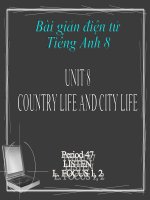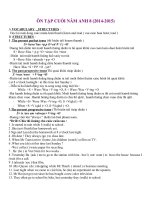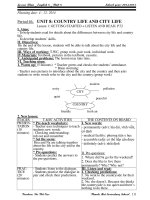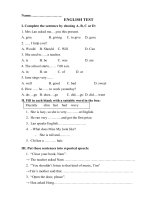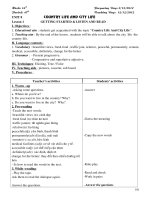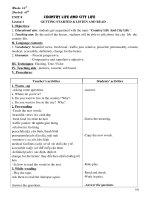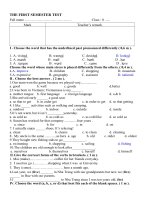Unit 8 Country life and city life -Tiếng anh 8
Bạn đang xem bản rút gọn của tài liệu. Xem và tải ngay bản đầy đủ của tài liệu tại đây (239.76 KB, 27 trang )
Week: 16
th
Preparing Day: 8/12/2012
Period: 47
th
Teaching Day: 12/12/2012
UNIT 8 COUNTRY LIFE AND CITY LIFE
Lesson 1 GETTING STARTED & LISTEN AND READ
I. Objectives :
1. Educational aim : students get acquainted with the topic “Country Life And City Life”.
2. Teaching aim : By the end of the lesson , students will be able to talk about the city life the
country life.
II. Language contents :
1. Vocabulary : beautiful views, fresh food , traffic jam, relative, peaceful, permanently, remote,
medical, accessible, definitely, change for the better
2. Grammar : - Present progressive.
- Comparative and superlative adjective.
III. Techniques: Eliciting, True / False
IV. Teaching aids : pictures, cassette, sub board
V. Procedures :
.
Teacher’s activities
1. Warm –up
-Asking some questions.
a. Where do you live?
b. Do you want to live in the country? Why?
c. Do you want to live in the city? Why?
2. Pre-reading
-Teach the new words.
beautiful views (n): cảnh đẹp
fresh food (n): thức ăn tươi
traffic jam(n): tắt nghẽn giao thơng
relative(n): họ hàng
peaceful(adj): yên bình, thanh bình
permanently(adv):lâu dài, mãi mãi
remote(v): xa xôi, hẻo lánh
medical facilities (adj): cơ sở vật chất cho y tế.
accessible (adj): (có thể) tiếp cận được
definitely(adv): xác đònh, đònh rõ
change for the better: thay đổi theo chiều hướng tốt
hơn
- Ss how to read the words in the text.
3. While -reading:
- Play the tape.
Ask them to read the dialogue again.
Answer the questions.
Students’ activities
-Answer
-Guess the meaning
-Copy the new words
-Role-play
-Read and check
-Work in pairs
- Answer the questions.
101
a) Where has Na been?
Na has been to Kim Lien Village.
b) How long was she there?
She was there for the weekend.
c) What is her opinion of the countryside?
To her, the countryside is peaceful and quiet and
there is nothing to do.
d) Na said, “There is nothing to do”, what does she
mean by this?
There is no libraries, no movies, no supermarkets,
no zoo…
e) What are some of the change that Hoa mentions?
Country is becoming better. Many remote area are
getting electricity. People can now have things like
refrigerators and TV medical facilities are more
accessible.
4. Post -reading
-divide the class into 4 groups. Two groups include
students who prefer the city life and the others
include students who prefer the country life.
-ask them to work in groups to answer the
questions.
Do you prefer the city or the country life? Why?
-ask them to report.
5. Homework :
-Write 5 sentences about your country life or city
life .
-Do exercises in Workbook.
-Prepare the part : Speak and listen
a. Na has been to Kim Lien Village.
b. She was there for the weekend.
c. To her, the countryside is peaceful
and quiet and there is nothing to do.
d. There is no libraries, no movies, no
supermarkets, no zoo…
e. Country is becoming better. Many
remote area are getting electricity.
People can now have things like
refrigerators and TV medical facilities
are more accessible.
-work in groups.
-report.
VI. Comments
__________
_____________
Week: 16
th
Preparing Day: 8/12/2012
Period: 48
th
Teaching Day: 14/12/2012
102
UNIT 8 COUNTRY LIFE AND CITY LIFE
Lesson 2 SPEAK + LISTEN
I. Objectives:
1. Educational aims: Students know the difference about the city life and the country life.
2. Teaching aim : By the end of the lesson, students will be able to practice speaking about the
changes of a place
II. Language contents :
1. Vocabulary :
2. Grammar : - Present progressive/ - Comparative and superlative adjective
III. Techniques: Brainstorming, eliciting.
IV Teaching aids : picture, cassette
V. Procedures :
Teacher’s activites
1. Warm-up
-Have the students answer some questions
* Have you ever been in the city?
* Do you prefer the city or the country?
2. Pre-speaking
Look at the pictures then comparative the city and
the country. The words in the box under the pictures
may help the students.
- Write the words prompts on the board so that can
speak easily.
Traffic busy
Sky cloudy
Houses high
City beautiful
Trees green
3. While -speaking
- Get them to work in pairs.
- Monitor and help students speak.
- Have students practice in groups or individual
- Check the mistakes and correct the answers.
* Possible answer.
- The town is becoming busier and noisier.
- The traffic is becoming busy.
- The buildings are becoming taller, more beautiful
and modern.
- The streets are getting dirty.
- Things are getting more expensive.
4. Post – Speaking:
- Ask students to talk about the change in your
hometown.
Student’ activites
Answer:
-Work in groups
-Individuals
-Work in pairs.
-work in pairs.
- Talk about the change in your
hometown.
- Listen and fill
103
- Set the scene: “Aunt Hang is talking to Lan on the
phone. She is coming to visit Lan in Hanoi”.
- Ask them to listen to the tape and complete the
dialogue on page 74.
- Let them listen twice and find out the missing
words.
- Ask them to share their answer with their partners.
- Call some students to read.
1. that 2. this 3. It’s 4. Where 5. From
6. coming 7. next week 8. arriving 9. Thursday
10. late afternoon 11. get
LISTENING
1. Pre-listening
- Introduces the content of the dialogue
-Asks sts to to read the dialogue carefully,then
guess and complete the dialogue
2. While-listening
-Plays the tape twice
-Call some pairs of students to read the dialogue
3. Post-Listening
-Give the answer key:
1. that 2. this 3. It’s 4. Where
5. from 6. coming 7. week 8. arriving
9. Thursday 10. late 11. afternoon 12.
speak
13. my 14. get
5. Homework:
Do exercises in Workbook
Prepare: Unit 8 ( READ )
-do the exercises.
- Write homework.
-Listen to the teacher
-Guess and complete the dialogue
-Listen and complete
-Listen to the tape and complete the
dialogue
-Check their result them selves
*The content of listening
Lan: Hello
Aunt Hang: Hello, Is that Lan
Lan: Yes. Who is this?
Aunt Hang:It’s Aunt Hang. How are you?
Lan: I’m fine. Where are you phoning from?
Aunt Hang:Hue.I’m calling to tell you your Uncle Chi and I are coming to visit you next week
Lan:Great! When are you arriving?
Aunt Hang:On Thursday. We’re arriving in Ha Noi in the late afternoon
Lan: Ok, Do you want to speak to my Mom?
Aunt Hang: Yes, please
Lan: Hold on a moment and I’ll get her
Week: 17
th
Preparing Day: 8/12/2012
Period: 49
th
Teaching Day: 14/12/2012
104
UNIT 8 COUNTRY LIFE AND CITY LIFE
Lesson 3 READ
I. Objectives :
-By the end of the lesson, students should know more about the country life and the city life.
-Reading comprehension about the problem of people from the countryside moving to the city.
-By the end of the lesson, students will be able to understand the text about one of the social
problem .
II/ Language contents:
1. Vocabulary:
rural, urban, well-paying, struggle, typhoon, flood, drought, destroy, increase, put a strain on,
supply, tragedy
2. Grammar: (review)
III/ Techniques:
Skimming, scanning,
Question and answer,
True or false, brainstorming, multiple choice
IV/ Teaching aids: Picture, textbook,
V. Procedures:
Teacher’s activities
1. Warm up :
*Jumbled words :
-Write the words with disordered letters on the board :
-fulenlpti - poontipula - tanaru – viroedp – suertl
- lfdoo - roestdy
2. Pre-Reading :
-Introduce the country life and the city life
-Have student read silently the text and find the new
words.
+ Explain some new words.
- rural, urban, traditional, well paying, struggle,
typhoon, flood, drought, destroy, increase,
overcrowding, live apart,
3. While-Reading :
*Gap-fling :
-Have Students read the text again then fill in the
blanks for the exercise 1/p75.
Check and correct the answer.
-Get feedback.
*Answer key :
1. leaving 2. home 3. city 4. rural
5. rural 6. problems 7. schools 8. hospital
9. problem 10. world .
Students’ activities
-Play the game
-Go to the board and write the correct
words
-plentiful – population – natural-
provide – result – flood - destroy
-Read silently.
-Give out the new words.
Read the text again and notice how to
pronunciation new words.
-Read the text again then fill in the
blanks for the exercise 1/p75.
-Work in pairs
-Give the answer
105
*Finding the words :
-Have students read the text again then fill in the
blanks for the exercise 1/p75.
- Have students write the answers on their mini board.
-Get feedback
a. of the country b. as many as needed
c. become greater or larger d. a great pressure
e. a terrible event f. of the city or city life
4. Post-Reading :
*discussion
-Giving situation: If you were a Minister, what would
you do for farmers?
-Ask students work in groups and possible answers:
+Build streets, theaters, stadium in the country
+Build schools, hospital
+Provide clean, electricity, facilities
+Build factory
5 .Homework :
-Rewrite the answer
-Do exercises : (Workbook)
-Lean new words by heart.
-prepare the next lesson. (Writing)
Read the text again then fill in the
blanks for the exercise 1/p75.
- Write the answers on their mini board.
-Give the answer
a. rural b. plentiful
c. increase d. strain
d. tragedy f. urban
-Work in groups.
- -write homework.
VI. Comment
__________
_____________
Week: 17
th
Preparing Day: 16/12/2012
Period: 50
th
Teaching Day: 19/12/2012
UNIT 8 COUNTRY LIFE AND CITY LIFE
Lesson 4 WRITE
106
I. Objectives :
-Writing letters to friends about the neighborhood
-By the end of the lesson, students will be able to write letters to their friends
II/ Language contents:
1/ Vocabulary: Ss’ background knowledge
2/ Structures: the present simple tense.
III/ Techniques: Questions and answers, group work, cross check
IV/ Teaching aids: Textbook
V. Procedures :
Teacher’s activities
1. Warm up :
- Ask them to put the out line for an informal
letter in the correct order
-Prepare 6 cards with 6 out line on them
-Call six students to rearrange them in the
correct order.
-Write the answer on the board so that Ss can
answer the outline of the letter .
*a formal letter :
1. Heading :
-Writer’s address.
- Date
2. Opening :
-Dear
3. Body of the letter :
4. Closing :
2. Pre-Writing :
Ask Ss some questions
-“Do you often write a letter to your friend? Or
Did you receive a letter you’re your fiend?”
-Ask Ss to work in pairs to answer the questions
in exercise 2 ( page 76 )
Give feedback
a. Where do you live ?
b. What does your house look like?
c. What can you see from your bedroom
window?
d. How far is it from your house to school ?
e. What kind of facilities are there in your
neighborhood?
f. What thing in your neighborhood do you
like best ? Why?
Students’ activities
- Whole class.
-Look at the card and choose the suitable
outlines.
- Take note the outline on the books and try
to remember.
-Answers
- Work in pairs .
a. I live in a small town /big house /village .
b. My house looks very nice/small with 4/5
rooms
c. From my bedroom window, I can see a
small park with many green trees and colorful
flowers.
d. It’s very near so I can walk to school .
e. There is a hospital, a post office, two
schools a market ……
107
-Check and correct.
3 .While-Writing :
-Introduce the context .
-Ask Ss to write letter to friend about their
neighborhood .
-Let them write individually
-Ask ss to compare with their partners and
correct if they can .
4. Post-Writing :
-Choose some letters to correct before class.
Model letter
Dear Lan!
Thanks for your letter. I’m pleased to tell
you about my new house. Now I live in a small
house on Dong Khoi street. It’s small but really
beautiful. From my bedroom window, I can see a
green rice paddy and a river. It’s not very far
from my home to my school, about 1 km. So I
walk to school everyday. In my neighborhood,
there is a stadium, which I like best because I
can go there to play soccer.
I hope you can come to my place some day.
Love
Hai Thuy
-Get feedback / Correct mistakes
5. Homework :
-Do exercise inwork book
-Prepare the next lesson.
f. I like ……….best .Because……….
- Share and compare with other group
-Read
- Write letter to friend about their
neighborhood
-Write (Individual)
- Compare with their partners and correct
(self-correct / teacher corrects)
- Read the letter.
-Write homework
VI. Comments
__________
_____________
108
Week: 17
th
Preparing Day: 16/12/2012
Period: 51
th
Teaching Day: 20/12/20122
UNIT 8 COUNTRY LIFE AND CITY LIFE
Lesson 5 LANGUAGE FOCUS
I. Objectives:
- Talk about the future events.
- Talk about the differences.
II. Language contents:
- Grammar: The present progressive
Comparative and superlative adjectives.
- Vocabulary: Long adjectives and short adjectives
III. Techniques: Speaking, Writing, Completing
IV. Teaching aids: Pictures, Books,Real objects
V. Procedures:
Teacher’s activities
1.2. Language focus 1
Ask them to do the exercise 1 on page 77.
- Call on some students to practice the dialogue.
- Give them the shipping information and ask
them to make similar dialogues.
Example:
S1: is the boat to Quy Nhon leaving at 11.30?
S2: Is that good fortune?
S1: That’s right.
S2: I’m very sorry. It’s been delayed.
S1: Oh no
S2: Now, it’s leaving at 13.35.
Example 2.
S1:s the boat from Canada arriving at 11.00?
S2: Are you talking about Diamond Eyes?
S1: Yes.
S2: it’s arriving on time.
2. Language focus 2
- Ask them to use the suitable verbs the present
progressive tense to complete the dialogue in
exercise 2 page 78.
-get some pairs to practice the dialogues before
the class and correct.
Students’ activities
- Practice with a partner.
S1: The boat from Canada arriving at 11.00?
S2: Are you talking about Diamond Eyes?
S1: Yes.
S2: it’s arriving on time.
- Give the answer:
a. am playing
b. are doing
a. am watching
d. am going
e. are cleaning
109
* Answer
a. am playing
b. are doing
a. am watching
d. am going
e. are cleaning
f. am having
3. Language focus 3
- Give the form: Be + V- ing
Use: describe changes with “get” and
“become”
- Ask them to do the exercises.
- Give the answer.
a. The boys are getting tall.
b. The old men are becoming weak.
c. It is getting dark.
d. The weather is getting cold.
e. The students are getting better.
f. The schoolyard is becoming cleaner.
4. Language focus 4.5
Remind students of the form of comparative
and superlative
a. Comparative
-…short adjective-ER+than +……
-…more + Long Adjectives + than +………
b. Superlative
S + Be + The + Short Adjective – EST + ……
S + Be + The + Most - long Adjective + …
c. Irregular adjectives:
Good / well - better - the best
Bad - worse - the worst
Many - more - the most
Little - less - the least
c. Practice :
-Ask students to do exercise 4 on page 79
-They have to work in pairs to make the
different between the city and the country
about food ,traffic, transport, air, entertainment,
medical facilities, school, electricity with the
adjectives easy, expensive, cheap, good, bad,
poor, big,
accessible, fresh .
f. am having
- Give the answer.
a. The boys are getting tall.
b. The old men are becoming weak.
c. It is getting dark.
d. The weather is getting cold.
e. The students are getting better.
f. The schoolyard is becoming cleaner.
- Give structures
- Give examples
- Listen and write
- Do exercises 4
- Work in pairs
- Correct
110
-Have students correct themselves.
-Then correct for them.
-Ask students to do exercise 5 on page 79
-Ask them to read the advertisement then ask
them some questions to check their
understanding.
5. Homework:
-do the exercises again
-Prepare the revision.
- Do exercise 5
THE TEN – MINUTE TEST
1. Write 5 sentences about the changes in your hometown.
2. Complete each of the following sentences in such a way that it has the same meaning as the sentences
printed before it (2.0pts) :
a. Ba is taller than Minh -> Minh is not …………………………………………………………………………………………………………….
b. She is more intelligent than her sister -> Her sister is not ……………………………………………………………………
c. Nobody in my class is better than Hoa-> Hoa is the………………………………………………………………………………….
d. My bad is different from yours ->Your bag is not as……………………………………………………………………………
e. A dress is more expensive than a shirt -> A shirt is ………………………………………………………………………………
* KEY AND MARKS :
1. 5Marks : - (1 m / 1 s ) .
Students answer themselves
2. 5 Marks : - (1 m / 1 s ) .
a. Minh is not as tall as Ba .
b. Her sister is not as intelligent as her .
c.Hoa is the best student in my class .
d. Your bag is not the same as mine(my bad)
c. A shirt is cheaper than a dress .
Khoái
lôùp
Toång
soá
Ñieåm >= 5 Ñieåm 8 - 10 Ñieåm 0 - 3 Ghi chuù
SL % SL % SL %
8A2
22
8A3
23
V. Comments:
__________
_____________
111
Week: 17
th
Preparing Day: 17/12/2012
Period: 52
nd
Teaching Day: 21/12/2012
REVISION OF THE FIRST TERM
I .Objectives :
1 . Educational aims : By the end of the lesson, students should understand all words and
structures they have learnt. .
2. Teaching aims :
II. Language contents :
1. Vocabulary :review
2. Grammar : present progressive, simple present, present perfect…
III. Teaching aids :
IV .Techniques: picture description / True / False guessing, question-answer, multiple choice.
V. Procedures :
I. Summary of tenses
1. Simple present tense
2. Simple Past Tense
S + V ( simple past ) + O
3. Simple future Tense (Thì Tương Lai Đơn ):
S + Will + V + O
4. Present Perfect Tense :
S + Have / Has + Vpp + O
* Negative :
S + Have / Has + Not + Vpp + O
* Question:
Have / Has + S + Vpp + O ?
5 . S + Be + (Not) + Adjective + Enough + To- infinitive
Eg : He is not old enough to go to cshool .
( He is not old .He can’t go to school) .
6.Talking about intentions with “going to”.
Eg : I am going to go to Da Lat next Sunday
7. Reflexive pronoun
Pronouns
I
You
He
She
We
They
proflexive
myself
yourself / yourselves
himself
herself
ourselves
themselves
8 .Used to : Đã từng ( habit in the past : diễn tả thói quen trong quá khứ )
I / We / You / They / + V + O
He / She / It … + V(s/es ) + O
112
*.PREPOSITIONS OF TIME : GIỚI TỪ CHỈ THỜI GIAN
- On+ thứ / ngày /tháng ngày .
- In + tháng / năm / mùa / buổi .
- At night / … o’clock .
- For + 1 khoảng thời gian ( a year / a week / Two days / a long time ….)
- Since + 1 mốc thời gian ( 1989 / last year / yesterday …)
- Between …… and……….
- Up to / until
. Choose the best answer:
1. They ‘ve studied……six o’clock . a.in b.at c.since d.for
2 My mother was ….last night, so we went out for dinner.
a. tired enough to cook b .too tired to cook c . tired for cooking
3 . ….have you lived in thisn town ? ( a. how much / how many /how far / how long)
4. Airmail is ….expensive than surface mail . ( a. the most / the same / as / more)
5. It’s two years since I last ……Joe . (a. see / saw ./ have seen / seeing )
6. He went to school late because he stuck in the … …this morning .
a. rush hour b. traffic light c . traffic jam d . cross road
7. Typhoons ,floods or droughts can easly ….,a harvest
a. destroy b. finish c. provide d. defeat
8. Which one is … ,milk or orange juice ? ( better / good / the best / well )
9. It …….in winter ; Now it ………. (a. is raining / doesn’t rain
b. rains / doesn’t rain c. rains / isn’t raining d. is raining / isn’t raining
10. The climate is ………hotter and hotter .
a. coming b. becoming c. getting d. b&c are correct
11. The party was great and we enjoy … very much . ( ourself / ourselves / usselves )
12. Our team won the game because we played very ……. … ( well / goodly / better )
13. Her mother is the …….age as yours . ( similar / same / as / diffirent )
14. We spent a lot of time …… that work . ( to do / doing / do / does )
15. You …… go to school late . ( must / must not / don’t have to / have to)
. Homework
-learn by heart structures.
-Prepare: Commands, request and advice in reported speech.
VI. Comments
__________
_____________
Week: 17
th
Preparing Day: 17/12/2012
Period: 53
rd
Teaching Day: 21/12/2012
113
REVISION OF THE FIRST TERM
I. Objectives :
By the end of the lesson, students should understand all words and structures they have learnt. .
II. Language contents :
1. Vocabulary :review
2 . Grammar
* Commands, request and advice in reported speech
*Comparative
III. Teaching aids :
IV. Techniques: True / False guessing, question-answer, multiple choice.
V. Procedures :
1 Commands, request and advice in reported speech.
(câu tường thuật )
a.Report Commands and requestudents : tường thuật lại câu yêu cầu và câu mệnh lệnh
S + asked / told + me + to infinitive .
b. Report advices: tường thuật lại một lời khuyên .
S + said + S + should + V( infinitive ).
2. Comparative . so sánh .
a. Equative : so sánh bằng
S + be (not) + as + Ajective + as ………
b. Comparative : so sánh hơn
S + Be + Short Adjective – ER + Than + …
S + Be + More -Long Adjective + Than + …
c. Superlative : so sánh nhất
S + Be + The + Short Adjective – EST + Noun
S + Be + The + Most - Long Adjective + Noun
Short Ajective : tính từ ngắn( tt một âm tiết )
I/ Rewrite the following sentences:
-
1 Ba said to Khanh " Can you work harder, please ? "
Ba asked
2 My father said to me " You should live better"
My father said
3 Minh said to his sister " Please buy me a newspaper"
Minh told
4 Jill is more intelligent than Bill. (as… as)
Bill isn't
5 Your hair is black. My hair is black, too. (the same)
Your hair color as
6 The film was so boring, but I thought it was interesting. (different from)
The film was quite…………………… what
114
7 He has worked for this company for ten years.
He started
8 Lan last visited her mother 2 months ago.
Lan has not
9 I went to the dentist's. I had a decaying tooth. (because)
I went
10 It's dangerous to leave medicine around the house.
Leaving
IV. Homework
-learn by heart structures.
-Prepare: . FORM OF VERBS :( DAÏNG ÑOÄNG TÖØ )
V. Comments
__________
_____________
Week: 18
th
Preparing Day: 17/12/2012
115
Period: 54
th
Teaching Day: 21/12/2012
REVISION OF THE FIRST TERM
I. Objectives :
By the end of the lesson, students should understand all words and structures they have learnt.
II. Language contents :
1. Vocabulary :review
2 . Grammar “: to – infinitives, bare – infinitives, gerund
III. Teaching aids :
IV. Techniques: True / False guessing, question-answer, multiple choice.
V. Procedures :
Review all the structures from unit 1 to unit 8.
Acticity 1. FORM OF VERBS :( DẠNG ĐỘNG TỪ )
Có 3 dạng ĐT :Bare infinitive ( V ) .To infinitive ( To V ).Gerund (V-ing )
1. Bare infinitive ( V ) .
Động từ nguyên mẫu đứng sau các động từ sau :
Modal Verbs / would rather / had better / let / make / feel / see / hear / notice/used to …+ V
2. To infinitive ( To V ).
Động từ nguyên mẫu có to đứng sau các động từ sau :
-want / intend / decide / expect / hope / mean / offer / promise / refuse / wish / ask /
invite/ agree/ advise / start / try / remember / would like / stop / like … + To infinitive
- Be + Adjectives + To infinitive .
- Be + Adjectives + enough + To infinitive .
- Be + too + Adjectives + To infinitive .
3. Gerunds after some words :
Động từ gerund (V-ing ) đứng sau các động từ sau :
- like, love, dislike, hate , enjoy , avoid, stop , suggest, ask + V-ing
start , begin , try , mind, finish,tell
- Prepositions ( on / in / of / for/ of /at …….) + V(infinitive)
- Be + Adjective + to infinitive
- Be + Adjective + enough + to infinitive
- Be + too + adj + to infinitive
Activity 2. COMPARATIVE . SO SÁNH .
Examples :
1, I like playing tennis
2, They love reading novels .
3, Would you mind telling me the way to the post office ?
4, We should avoid drugs .
5, He enjoys listening to music.
6. My mother is interested in watching TV .
7. He is fond of traveling.
8. They refuse to go out .
116
9. We decided to go to Da lat
10 . It ‘s very difficult to learn Chinese .
(underline the word or phrase that would bet complete the sentences)
1. He hasn’t been here (for / since / at ) Christmas.
2. The children shouldn’t (to play / play / playing) football in the street.
3. If you are not careful, you will cut (herself/ himself/ yourselves).
4. John is as (as tall as/ taller as / tall as) Tom.
5. We must be there (between / in / at) 9.30 and 10.30.
6. He enjoy (reading / to read / reads) picture books.
7. Mai is the (most intelligent / the most intelligent / intelligent ) girl in her class.
8. A car is (expensive / more expensive/ expensiver) than a motorbike.
9. Do you need any help ? ( Sure / No problem / Yes. That ‘s very kind of you)
10.My father has worked for his company (for / since / in) 20 years.
11.He plays (skillful / skillfully / skill)
12.(Scout / Scouting / Scouting) began in England in 1907.
13.The boys are (get / getting / gets) taller.
IV. Homework
-learn by heart structures.
V. Comments
__________
_____________
Week: 18
th
Preparing Day: 17/12/2012
Period: 55
th
,56
th
Teaching Day: 23/12/2012
117
REVISION OF THE FIRST TERM
I. Objectives :
By the end of the lesson, students should understand all words and structures they have learnt.
II. Language contents :
1. Vocabulary :review
2. Grammar : present progressive, simple present, present perfect…
III. Techniques:
picture description / True / False guessing, question-answer, multiple choice.
IV. Teaching aids: Textbook, chalk…
V. Procedures:
*Activity 1 Give the structures:
1. Present Simple tense.( Thì hiện tại đơn)
- Use : Để diễn tả các sự việc một cách tổng quát , không nhất thiết chỉ nghó đến hiện tại . Ta
dùng thì này để nói đến mot sự việc nào đó xảy ra liên tục ,lặp đi lặp lại nhiều lần, hay môt
điều gì đó luôn luôn đúng, dù cho sự việc đó có xảy ra ngay tại lúc nói hay không là điều không
quan trọng .
- Form: + S + V/V
s / es
+ ……………………. Ex -The earth goes around the sun.
- S + don’t/doesn’t + V+ ……………… -We don’t have classes on Sunday.
? Do/Does + S + V + ………………….? - Does Lan speak French?
2. (not ) adjective + enough + infinitive ( không ) đủ ……………… để
Ex: The water is hot enough for me to drink.
She isn’t old enough to be in my class
3. Near Future: Be going to ( thì tương lai gần )
- Form : S + is / am/ are + going to + Vinf
- Use : Dùng khi nói về một việc mà ai đó quyết đònh sẽ làm hay dự đònh sẽ làm trong tương
lai.
Ex : There is a good film on TV tonight. I’m going to stay home to watch TV .
- Note : Be going to còn dùng để dự đoán một tình huống có thể xảy ra
Ex: I feel tired . I think I’m going to be sick.
4. Adverb of place ( Trạng từ chỉ nơi chốn ): out side, inside, there, here, upstairs, downstairs
,next to, under ,…………
Ex: The money was finally found under the boards.
5. Reflexive pronouns.( Đại từ phản thân) : myself, yourself, himself, herself, itself, ourselves,
yourselves, themselves .
- Diễn tả hành động trở lại với chính người thực hiện .
+ Nó có thể làm túc từ (Object ) Ex: Be careful You’ll cut yourself.
+ Nó đứng ngay sau từ mà nó làm mạnh nghóa. Ex : An sent this letter itself.
- Đại từ phản thân làm mạnh nghóa cho chủ từ. Nó đứng ngay sau chủ từ, hoặc đứng ở cuối
mệnh đề /câu. Ex: Mary herself cleaned the floor.
6. Modal verbs
- Form : + S + modal verb + V + ………. Ex : I can sing very well.
- S + modal verb + not + V + ……… Ex : Hoa may not come to the party tomorrow.
? Modal verb + S + V + ………….? Ex : May I come in ?
118
- Modal verb : must, ought to, have to,should
* MUST : là khiếm trợ động từ ( a modal ) diễn tả sự bắt buộc hay sự cần thiết có tính chủ
quan- do cảm nghó của người nói. (Ex: He must do this exercise again.), hay diễn tả tính qui tắc
hay lề luật . (Ex: We must drive on the right.)
* HAVE TO : diễn tả sự bắt buộc hay sự cần thiết có tính khách quan – do yếu tố bên ngoài.
Ex: Your eyes are weak. You have to wear glasses.
* OUGHT TO + V(base form) (nên): diễn tả lời khuyên. Ex: We ought to obey our parents.
* SHOULD: diễn tả lời khuyên Ex: You should help the needed children.
* MAY / CAN / COULD : được dùng để diễn tả lời yêu cầu hay đề nghò
- Yêu cầu sự giúp đỡ: Can / Could + you + V + O / A, please ?(Ex: Can you help me,
please.)
- Đề nghò giúp ai: May + I + V + O/A ?; Let + me + V + O/A. ; Do you need any help?
Shall + I + V + O / A ? Ex: May I help you?
* WILL: dùng để diễn tả lời yêu cầu , đề nghò hoặc lời hứa
- Will + you + V + O + A / M , please? Diễn tả lời yêu cầu.
Ex: Will you turn of the fan, please? I’m cold.
- I + will + V + O + A / M ? diễn tả lời đề nghò làm điều gì cho ai .
Ex: The phone is ringing . I’ll answer for you.
- S + will + V + O + A / M ? diễn tả lời hứa . Ex: I’m sory. This won’t happen again.
* Would / Do you + mind + . . . + ? diễn tả lời yêu cầu lòch sự .
- Would you mind + V-ing ( gerund) ? Ex:Would you mind telling me the result of the exam.
- Would / Do you mind if + I + V . . .? diễn tả yêu cầu được làm điều gì
Ex: Would you mind if I opened the window? Do you mind if I open the window?
7. Questions with “WHY” : Dùng để hỏi về nguyên nhân hay lý do
Why + do / aux. V + S + Vm +
O . . . ?
Ex: Why do they cover the electric sockets?
Để trả lời cho câu hỏi với WHY ta có thể dùng :
- Mệnh đề với “because”. Ex: Why do you get up early? – Because I want to do exercise.
- Cụm động từ nguyên mẫu . Ex: Why do you do exercise? – To keep healthy.
8. Past Simple Tense (Thì quá khứ đơn)
- Use : Diễn tả hành động xảy ra và kết thúc tại một thời điểm xác đònh ở quá khứ
- Form: + S + V
-ed(regular)
/ V
2 ( column irregular)
+ ………… Ex : - He arrived here yesterday.
- S + didn’t + V + …………………. - She didn’t go to school yesterday.
? Did + S + V + …………………… ? - Did you clean this table?
- Note: Thì quá khứ đơn thường được dùng với các cum từ chỉ thời gian xác đònh ở quá khứ : last
week / month / year . . ., a week / 3 days / 5 months . . . , yesterday, yesterday morning /
evening, In+ năm, from 2000 to2005
- Cách đọc các đông từ ở quá khứ đơn với “ ED”:
+ “ ED”: được đọc là /t/ khi những động từ nguyên mẫu có âm tận cùng là /f/, /k/, /p/,
/s/,/tΣ/, /Σ/.
Ex : laughed , asked , helped , watch , pushed , dressed , ……………
119
+ “ ED”: đươcï đọc là /id/ khi những động từ nguyên mẫu có âm tận cùng là /d/ và /t/
Ex : needed , wanted , waited , ……
+ “ ED”: đươcï đọc là /d/ khi những động từ nguyên mẫu có âm tận cùng là các âm còn lại
Ex : enjoyed , saved , filled ,……….
9. Preposition of time ( Giới từ chỉ thời gian ) : at, in ,on, from . . . to, for, by
- AT : + một điểm thời gian cụ thể Ex : We have class at one o’clock.
+ night Ex : I sleep at night.
- IN : + tháng/năm cụ thể Ex : I was born 1994
+ the morning/afternoon / evening Ex : We have class in the morning.
- ON: + ngày trong tuần Ex : We have class on Monday.
+ ngày tháng năm Ex: I was born on April 6, 2006
- FROM + một điểm thời gian + TO + một điểm thời gian
Ex: We have class from 7.00 to 10.15
- FOR: + một khoảng thời gian : để nói rằng một cái gì đó diễn ra bao lâu rồi
Ex : We walked for 2 hours to reach the waterfall.
10. Used to + V(bare form) : diễn tả một thói quen trong quá khứ nay không còn
Ex: He used to play tennis.
* Note : Sự tương phản: USED TO + V(bare form) (Đã từng )
BE / GET + USED TO + NOUN PHRASE / GERUND ( Quen )
Ex: Ba was born in a farmer family. He’s used to working in the sun.
Review all the structures from unit 1 to unit 8.
1. I ………………… a letter from my old fiend last week.
a. sent b. gave c. received d. took
120
2. “Would you ……………………to go to the movies with me?” “I’d love to”
A like b. want c. love d. mind
3. He is not ………………………… get married.
a. enough old to b. enough old for
c. old enough to d. old enough for
4. her mother ………………this city 2 years ago.
a. left b. leaves c. is leaving d. will leave
5. they enjoy………………….jokes.
a. to tell b. tell c. telling d. told
6. Deaf-mutes can……… speak………….hear.
A. both……….and B. not only………but also C. neither….nor D. either…nor
7. Alexander Graham Bell …………… the telephone in 1876.
A. emigrated B. demonstrated C. transmitted D. invented
8. Alexander Graham Bell was born ………………….March 3 , 1847.
a. on b. at c. during d. in
9. he’ll come ……………to pick you ………………
a. on/in b. over/ on c. in / up d. over/up
10. our friends ………………………meet us at the station tonight.
a. are b. are going to c. go to d. will go to
11. Don’t come in. Please wait ………………… for your turn.
a. inside b. downstairs c. outside d. upstairs
12. Would you like ……………………… a message?
a. to leave b. leave c. leaving d. left
13. The children are enough to look after …………
a. themselves b. ourselves c. herself d. for themselves
14. We ought ………….the wardrobe in the corner opposite the table.
a. Put b. push c. to put d. to push
15. What was wrong with you? Why ………………… go to the hospital?
a. had you to b. did you have to c. must you d. did you must
16. When I was a child, I …………follow my mom to the market.
a. used to b. like c. get used to d. usually
17. they’ll arrive ………………… 7.30.
a. at b. before c. between d. after
18. we must be there …………… Monday, 14 July.
a. in b. on c. at d. during
19. She asked her children……………
a. to stop playing b. stop playing c. stop playing d. stopping to play
20. Her parents are always proud…………….him.
a. about b. of c. at d. on
21. She advised me ………………………… late.
a. not b. not to be c. not be d. not being
22. It’s too cold outside. ……………… you close the door, please?
a. do b. Are c. Could d. Why don’t
121
23. She is studying hard……………………pass the final exams.
a. for b. in order to c. so to d. so that
24. Nam hates ……………….to the market.
a. to go b. going c. goes d. go
25. Can you fill …………………….this form for me?
a. out b. on c. in d. a and b
26. You should walk on the ………………
a. sidewalk b. street c. avenue d. road
27. “May I help you?”-“……………….”
a. what can I do for you? B. I’m afraid I’m busy
c. Yes. That’s very kind of you. d. how can I help you
28. The new shopping mall is quite …………………the present shopping area.
a. different from b. the same c. like to d. similar
29. She has …………… over 30 pages since yesterday.
a. written b. wrote c. written d. write
30. ……………… have you lived this town? – For nearly 10 years.
a. When b. Where c. How d. What
* Homework : Do the all exercises again and Prepare do the first examination:
THE TWENTY – MINUTE TEST
I. Choose the most suitable word or phrase to fill in the blanks.(5.0pts)
1. The population of the world ……………………….very past.
A. rises B. is rising C. has risen D. rose
2. Does your mother enjoy ……………………………. News?.
A. watch B. to watch C. watching D. watched
3. I always proud…………….mu brother.
A. of B. about C. at D. on
4. London is different ………………… our capital city.
A. with B. from C. on D. in
5. Which one is ……………………….,milk or orange juice?
A. better B. good C. the best D. well
6. Minh ……………… in this town since 1977.
A. live B. has lived C. lived D. is living
7. Hoa : Can you help me?- Ba :…………………………………………………
A. Sure. What can I do for you? B. Yes, please C. Yes. That’s very kind of you.D. No problem
8. My teacher said that I should study …………
A. hardly B. good C. bad D. hard
9. I’ll have meeting …………………. 7.30 am and 9.30 am.
A. at B. on C. between D. from
10. My mother told me …………………… fast.
A. drive B. to drive C. driving D. not to drive
II. Complete each of the following sentences in such a way that it has the same meaning as the sentences
printed before it (5.0pts) :
1 Ba said to Lan " Can you give me a pen ? " -> Ba asked Lan
2. Tom is more intelligent than Bill. -> Bill isn't
122
3. We started to learn English three years ago. ->We haven’t
4. Lan last wrote to me last year. -> Lan has not
5. I often went to the beach when I lived in Nha Trang. -> I used
*ANSWER KEY
I. (5pts – 0.5pt/1s)
1. B 2. C 3. A 4. B 5. C 6.B 7. A 8. D 9. C 10. D
II. (5pts- 1.0pt/1s)
1. Ba asked Lan to give him a pen.
2. Bill isn’t as intelligent as Tom .
3. We haven’t learned/learnt English for three years.
4. Lan hasn’t written to me since last year.
5. I used to go to the beach when I lived in Nha Trang.
IV. RESULT
Khối
lớp
Tổng số
Điểm >= 5 Điểm 8 - 10 Điểm < 5 Điểm 0 - 3
SL % SL % SL % SL %
8A2
22
8A3
23
Week: 18
th
Preparing Day: … /12/2012
Period: 57
th
Teaching Day: 24/12/2012
THE FIRST TERM EXAMINATION
I. Objectives.
Rechecking the knowledge of the students from unit 1 to unit 8
RESULT
Khối
lớp
Tổng
số
Điểm từ 5 trở lên Điểm từ 8 trở lên Điểm từ 3 trở xuống
SL % SL % SL %
8A2
22
19 86,4 11 50 0 0
8A3
24
17 70,8 0 0 1 4,2
COMMENTS:
……………………………………………………………………………………………………………………………………………………………………………………………………….
……………………………………………………………………………………………………………………………………………………………………………………………………….
……………………………………………………………………………………………………………………………………………………………………………………………………….
……………………………………………………………………………………………………………………………………………………………………………………………………….
123
1. Theme: Personal information, Education, Communities
2. Topic: Friends, House and home, Our past, School life and study habits, Shopping,
Neighborhood, Country life and city life.
3. Speaking
Ask and respond to questions.
4. Writing:
Using words cues.
Write a short paragraph.
5. Reading:- Read a passage 50-80 words for invention.
6. Listening: Listen to a paragraph about family
124
7. Language focus:
Tenses, Reported speech, enough, be going to, adverbs of places, reflexive pronoun, modal
verbs, adverbs of manner. Prepositions of time. Gerunds. Used to, comparative and superlative
II. Test Specification
LANGUAGE
FOCUS/
SKILL
TOPIC INPUT TEST TYPE
No. of
ITEMS
WEIGHTING
Grammar
and
vocabulary
Simple tense,
reflexive
pronoun, modal
verbs, adverbs of
manner. Present
perfect,
Prepositions of
time. Gerunds.
Used to,
pronunciation
Gapped
sentences
Multiple
choice items
10 items.
0,25/1 item.
25%
- word meaning
- word form
Gapped
sentences
6 items.
0,25/1 item
15%
Reading Education A factual
text
(110-140
words)
- Answer The
Question
- True/ False
4 items.
0,5/1 item
4 items.
0,25/1 item
30%
Writing - Reported
Speech
- Adj + Enough
- Be going to
- as … as
- Letter
Sentences
cues
-
Transformation
- Cue word
4 items.
0,5/1 item
4 items.
0,25/1 item
30%
III. TESTING
Test No. 1
I. Choose the best answer. (3 pts)
1. We …………………. to the zoo last Sunday.
A. go B. went C. gone D. have gone
125

